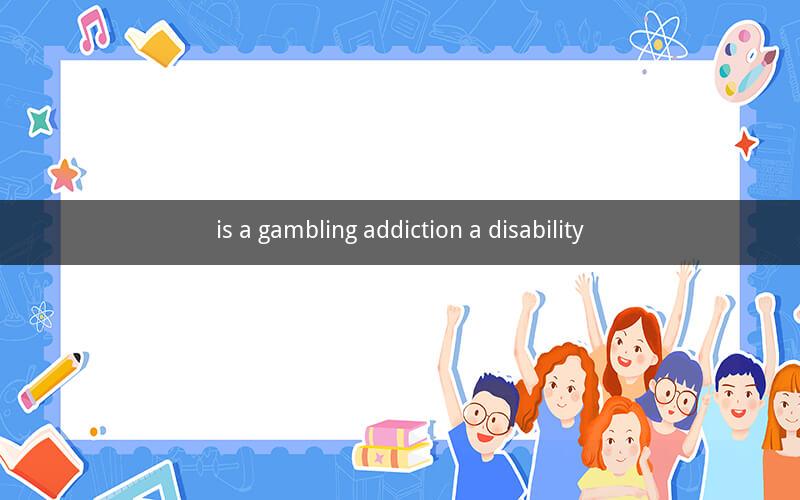
Table of Contents
1. Understanding Gambling Addiction
2. Defining Disability in the Context of Mental Health
3. The Intersection of Gambling Addiction and Disability
4. Legal and Ethical Implications
5. Support and Resources for Individuals with Gambling Addiction
6. The Role of Therapy and Counseling
7. Societal and Cultural Perspectives
8. The Impact on Families and Relationships
9. Preventing and Treating Gambling Addiction
10. Conclusion
1. Understanding Gambling Addiction
Gambling addiction, also known as problem gambling or compulsive gambling, is a behavioral disorder characterized by an inability to control the urge to gamble, despite harmful consequences. This addiction can manifest in various forms, including online gambling, slot machines, poker, lottery, and other casino games.
2. Defining Disability in the Context of Mental Health
The term "disability" refers to a physical or mental condition that limits a person's ability to perform certain tasks or activities. In the context of mental health, disabilities can include a range of conditions that affect a person's cognitive, emotional, and behavioral functioning.
3. The Intersection of Gambling Addiction and Disability
The intersection of gambling addiction and disability is a complex issue. Some individuals with gambling addiction may also have other mental health conditions, such as depression, anxiety, or substance use disorders, which can contribute to their addiction. Additionally, gambling addiction can be considered a disability due to its impact on an individual's functioning in various areas of life.
4. Legal and Ethical Implications
The classification of gambling addiction as a disability has significant legal and ethical implications. It affects access to treatment, accommodations, and support services. In some jurisdictions, individuals with gambling addiction may be eligible for protections under disability laws, which can help ensure their rights are respected.
5. Support and Resources for Individuals with Gambling Addiction
Support for individuals with gambling addiction is crucial. Various resources are available, including counseling, therapy, support groups, and financial assistance. These resources can help individuals develop coping strategies, manage their addiction, and regain control of their lives.
6. The Role of Therapy and Counseling
Therapy and counseling play a vital role in treating gambling addiction. Cognitive-behavioral therapy (CBT) is particularly effective in helping individuals identify and change negative thought patterns and behaviors associated with their addiction. Other forms of therapy, such as dialectical behavior therapy (DBT) and motivational interviewing, can also be beneficial.
7. Societal and Cultural Perspectives
Societal and cultural perspectives on gambling addiction can vary widely. In some cultures, gambling is seen as a recreational activity, while in others, it is viewed as a serious problem. Understanding these perspectives can help inform the development of effective prevention and treatment strategies.
8. The Impact on Families and Relationships
Gambling addiction can have a devastating impact on families and relationships. It can lead to financial strain, emotional distress, and strained communication. Support for families is essential in helping them cope with the challenges posed by a loved one's addiction.
9. Preventing and Treating Gambling Addiction
Preventing and treating gambling addiction requires a multifaceted approach. Education about the risks of gambling, early identification of problem gambling, and access to treatment are crucial components of this approach. Prevention efforts should target both individuals and communities, emphasizing the importance of responsible gambling.
10. Conclusion
Gambling addiction is a complex disorder with significant implications for individuals, families, and society. While the classification of gambling addiction as a disability is a subject of ongoing debate, it is clear that support, resources, and treatment are essential for individuals struggling with this addiction. By understanding the intersection of gambling addiction and disability, we can work towards a more compassionate and effective approach to addressing this pressing issue.
10 Questions and Answers
Question 1: Can gambling addiction be considered a disability?
Answer: Yes, gambling addiction can be considered a disability, as it significantly impairs an individual's ability to function in various areas of life.
Question 2: What are the common symptoms of gambling addiction?
Answer: Common symptoms include an inability to control the urge to gamble, preoccupation with gambling, and continued gambling despite negative consequences.
Question 3: How can therapy help individuals with gambling addiction?
Answer: Therapy can help individuals develop coping strategies, identify and change negative thought patterns, and learn to manage their addiction.
Question 4: Are there any legal protections for individuals with gambling addiction?
Answer: Yes, some jurisdictions provide legal protections for individuals with gambling addiction under disability laws.
Question 5: What are the risk factors for developing a gambling addiction?
Answer: Risk factors include a family history of addiction, mental health conditions, and exposure to gambling at an early age.
Question 6: How can families support a loved one with gambling addiction?
Answer: Families can support their loved ones by providing emotional support, encouraging treatment, and seeking support for themselves.
Question 7: Are there any medications available to treat gambling addiction?
Answer: While there are no medications specifically designed to treat gambling addiction, some medications may be used to manage co-occurring conditions.
Question 8: How can communities prevent gambling addiction?
Answer: Communities can prevent gambling addiction by promoting responsible gambling, educating the public about the risks, and providing resources for individuals in need.
Question 9: Can online gambling contribute to the development of gambling addiction?
Answer: Yes, online gambling can contribute to the development of gambling addiction due to its accessibility and convenience.
Question 10: What role does society play in addressing gambling addiction?
Answer: Society plays a crucial role in addressing gambling addiction by providing support, resources, and raising awareness about the issue.